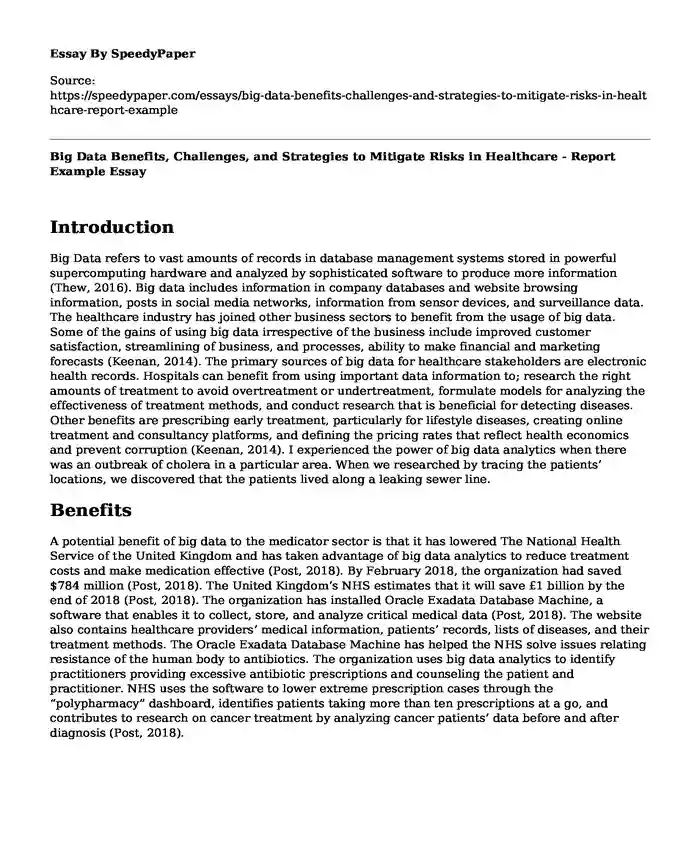
| Type of paper: | Essay |
| Categories: | Health and Social Care Data analysis |
| Pages: | 3 |
| Wordcount: | 719 words |
Introduction
Big Data refers to vast amounts of records in database management systems stored in powerful supercomputing hardware and analyzed by sophisticated software to produce more information (Thew, 2016). Big data includes information in company databases and website browsing information, posts in social media networks, information from sensor devices, and surveillance data. The healthcare industry has joined other business sectors to benefit from the usage of big data. Some of the gains of using big data irrespective of the business include improved customer satisfaction, streamlining of business, and processes, ability to make financial and marketing forecasts (Keenan, 2014). The primary sources of big data for healthcare stakeholders are electronic health records. Hospitals can benefit from using important data information to; research the right amounts of treatment to avoid overtreatment or undertreatment, formulate models for analyzing the effectiveness of treatment methods, and conduct research that is beneficial for detecting diseases. Other benefits are prescribing early treatment, particularly for lifestyle diseases, creating online treatment and consultancy platforms, and defining the pricing rates that reflect health economics and prevent corruption (Keenan, 2014). I experienced the power of big data analytics when there was an outbreak of cholera in a particular area. When we researched by tracing the patients’ locations, we discovered that the patients lived along a leaking sewer line.
Benefits
A potential benefit of big data to the medicator sector is that it has lowered The National Health Service of the United Kingdom and has taken advantage of big data analytics to reduce treatment costs and make medication effective (Post, 2018). By February 2018, the organization had saved $784 million (Post, 2018). The United Kingdom’s NHS estimates that it will save £1 billion by the end of 2018 (Post, 2018). The organization has installed Oracle Exadata Database Machine, a software that enables it to collect, store, and analyze critical medical data (Post, 2018). The website also contains healthcare providers’ medical information, patients’ records, lists of diseases, and their treatment methods. The Oracle Exadata Database Machine has helped the NHS solve issues relating resistance of the human body to antibiotics. The organization uses big data analytics to identify practitioners providing excessive antibiotic prescriptions and counseling the patient and practitioner. NHS uses the software to lower extreme prescription cases through the “polypharmacy” dashboard, identifies patients taking more than ten prescriptions at a go, and contributes to research on cancer treatment by analyzing cancer patients’ data before and after diagnosis (Post, 2018).
Potential Challenges
A potential challenge to using big data in the clinical system relates to the legal challenges of handling access to patient records. The federal law protects the privacy of patients’ data; hence access to patients’ records and using it for data analytics may be a lengthy process and involve so many legal challenges (Abouelmehdi et al., 2018). The fear of being sued may thus discourage nurses from sharing patients’ information. Legal challenges also touch on the rights to ownership of the data (Abouelmehdi et al., 2018). The individual patient, health care providers, insurance firms, and software providers may access patient information.
Strategy to Mitigate the Challenges of Using Big Data
Medical facilities can effectively handle patients’ privacy concerns by coming up with procedures and policies that address legal challenges. Hospitals should limit the data’s authorization and access to a few individuals with the patient’s consent (Bakken & Koleck, 2019). They should also design the software to prevent unauthorized access or analysis of patients’ information (Bakken & Koleck, 2019).
Reference
Abouelmehdi, K., Beni-Hessane, A., & Khaloufi, H. (2018). Big healthcare data: Preserving security and privacy. Journal of Big Data, 5(1). https://doi.org/10.1186/s40537-017-0110-7
Bakken S., & Koleck T.A. (2019). Big data challenges from a nursing perspective. In: Househ M., Kushniruk A., Borycki E. (eds) Big data, big challenges: A healthcare perspective (pp.3-16). Lecture Notes in Bioengineering. Springer, Cham. https://doi.org/10.1007/978-3-030-06109-8_1
Keenan, G. (2014). Big data in health care: An urgent mandate to change nursing EHRs! Online Journal of Nursing Informatics (OJNI), 18(1) http://ojni.org/issues/?p=3081
Post, L. C. (2018, February 7). Big data helps UK National Health Service lower costs and improve treatments. Forbes. https://www.forbes.com/sites/oracle/2018/02/07/big-data-helps-uk-national-health-service-lower-costs-improve-treatments/.
Thew, J. (2016, April 9). Big data means big potential, challenges for nurse execs. Health Leaders Media. https://www.healthleadersmedia.com/nursing/big-data-means-big-potential-challenges-nurse-execs.
Cite this page
Big Data Benefits, Challenges, and Strategies to Mitigate Risks in Healthcare - Report Example. (2024, Jan 08). Retrieved from https://speedypaper.net/essays/big-data-benefits-challenges-and-strategies-to-mitigate-risks-in-healthcare-report-example
Request Removal
If you are the original author of this essay and no longer wish to have it published on the SpeedyPaper website, please click below to request its removal:
- Free Essay Example on Exponential Growth and Moore's Law
- Essay Sample on Smartphone Addiction Among Adolescents
- Essay Sample on Alkaptonuric Ochronosis: Formal Case Report
- Paper Example: Depression and Risk of Heart Disease Mortality
- Essay Example: Computer Numerical Control (CNC) Systems
- Free Essay. Physiological, Cognitive, Sociological, and Emotional Developmental Effects of Untreated Depression
- 4A-High Throughput Screening Lecture Summary - Free Paper Sample
Popular categories




